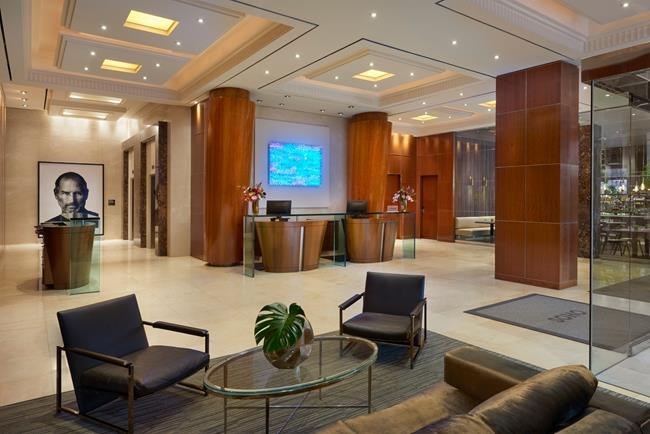Each day, SoHo hotel general manager David Kelley hears the sound of his footsteps echoing off the marble floors and panelled walls as he walks across the lobby, a space as empty as the 89 rooms above him.
"It is very quiet. We keep it locked in the evening," he said. "You don't have the music, you don't have the people popping in and out of the two restaurants...It’s downright sad."
As the summer travel season dawns, hoteliers and the broader tourism industry worry they will be hit longest and hardest by the COVID-19 crisis as confinement measures begin to lift but travellers remain largely unwilling or unable to cross borders.
Canada's $102-billion tourism sector, already battered by a near-total dropoff in commercial and leisure travel, hopes to salvage some business through regional trips and late-summer events.
To ride out the crunch, hotel operators are calling for a delay on debt and property tax payments while tourism groups are demanding more clarity from government on inter-provincial travel guidelines.
The SoHo, which laid off 85 per cent of its staff after closing on March 20, aims to reopen in July or August, despite reports Wednesday of an extended border shutdown with the United States until late July (the boutique hotel's 56 longer-term occupancy suites remain open).
Kelley said visits to the city may creep up as restaurants and tourist attractions unlock their doors, but that "local leisure" can only generate so much business.
"The Rogers Centre, CN Tower, Ripley's Aquarium...with all of these things not allowed to be open, it really risks what’s going to happen this summer," he said.
"The big issue is, will people want to come? The one thing we can't control is what’s in someone's head. What’s the confidence level?"
To pave the way for potential visitors, Tourisme Montreal is pressing the federal and provincial governments for clearer guidelines around travel across provincial lines.
Most provinces have an open border, though gatherings of more than 10 people are still banned in some regions.
"They're pushing on the gas petal but also on the brake at the same time. It’s not totally clear if you would be welcome in Ontario if you are from Alberta," said organization president Yves Lalumiere.
Travel within Canada is all the more important since most international visitors remain effectively barred from entry, he said.
Tourisme Montreal and 29 other signatories, including Air Canada and the Marriott and Germain hotel chains, sent a six-page letter to Quebec Premier Francois Legault this week calling for relief measures and a clear plan of action so visitors can book well in advance.
For now, Ottawa is encouraging Canadians to "visit local," though it said the ultimate decision on who can cross regional boundaries rests with individual provinces.
"As the summer season approaches, we invite all Canadians to discover their big and beautiful country," said Alexander Cohen, press secretary to Tourism Minister Melanie Joly, noting local public health guidelines apply.
Destination Canada recently announced it will redirect from international promotional efforts $30 million to domestic marketing, he said.
About 800,000 of the 1.8 million Canadians who work in tourism have lost their jobs, according to the Tourism Industry Association of Canada.
"Canada’s visitor economy was the first-hit and hardest-hit industry from the COVID pandemic, and will be one of the last to recover," association president Charlotte Bell said in a release.
The occupancy rate for Canadian hotels has begun to nudge up week over week, but still sat at 19 per cent for the week ending May 23 versus 72 per cent a year earlier, according to hotel market data firm STR Inc.
The Tourism Industry Association of Ontario said one-quarter of its members have closed temporarily and one in three has laid off more than 75 per cent of their employees.
In Kingston, Ont., the sector has been "devastated" by the absence of sports events, music festivals and business conferences, while fixed costs such as utilities bills and property taxes remain, albeit with payment deferrals from municipal governments, said Krista LeClair, who heads industry group Kingston Accommodation Partners.
"It's completely gone dark," she said, with rooms selling for as low as $20 per night.
The ripple effects are severe as well.
"For inns or Airbnbs, when the larger hotels sell out those other properties benefit from trickle-down business," LeClair said. Small businesses affected range from caterers to DJs to laundry services.
About 95 per cent of staff in the Kingston-area accommodations sector have been laid off, she said.
Kingston Accommodation Partners is asking the province for greater financial relief in the form of grants and loan forgiveness as well as a government directive for insurance companies to honour business interruption claims.
"It's up to the government to either tell the insurance companies to honour the claims for business interruption insurance now, before hotels declare bankruptcy, or to implement a moratorium on mortgage payments for hotels and a moratorium on realty taxes until hotel occupancy is at 50 per cent," said Cassie Prosper, who represents a group of Ontario hotel owners.
This report by The Canadian Press was first published June 10, 2020.
Christopher Reynolds, The Canadian Press


